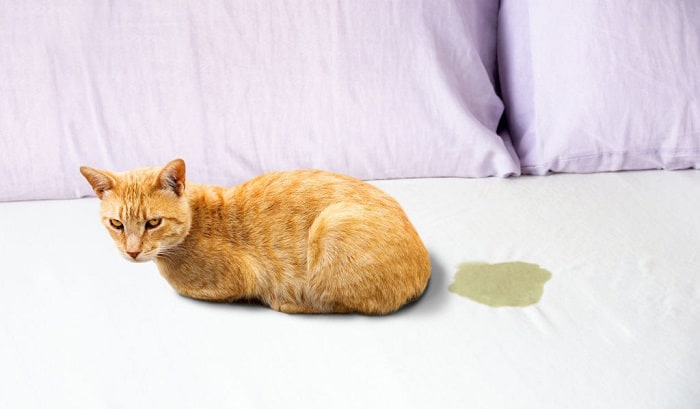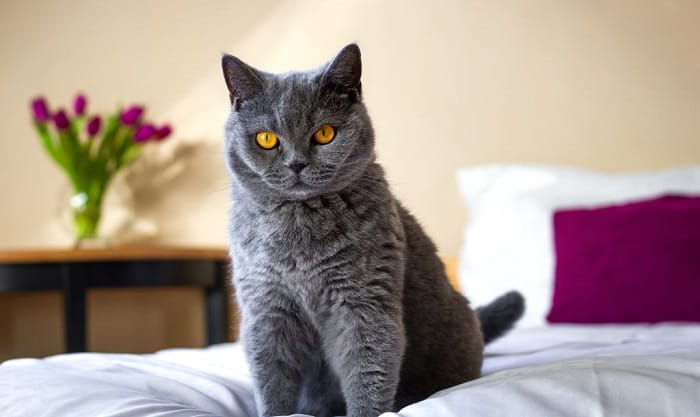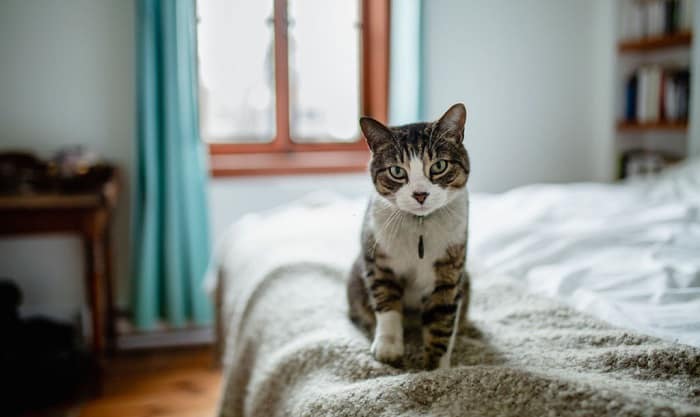Have you ever been awake and hoped you were experiencing a nightmare because you discovered kitten pee on bed? Your cat urinates on bed, which is a problem that some pet parents have to cope with.
You may ask yourself “why is my cat peeing on my bed, and what can I do to stop such unwanted behaviors?”
Finding the cause of cats peeing on your bed is crucial to prevent it from happening again.
Table of Contents
Why Does My Cat Keep Peeing on My Bed
As a cat owner, you might say that most cats are relatively private when it comes to their bathroom habits. When your lovely, innocent kitten does something so out of character as pee in off limited places, it’s always a shock.
While it’s tempting to dismiss “cat pee on my bed” as an act of defiance, vengeance, or sheer evil, cats pee on a human’s bed might be the result of several causes.
Let’s look at a few possible reasons:
1. Litter box location
Consider the position of your cat’s litter box in contrast to the bedroom, which is generally one of the quietest areas in the house. Cats are private creatures that like to keep their box in a quiet area where they will not be bothered.
Cats, like you, don’t like anyone watching them go to the bathroom. Therefore, the box should always be in a place without high foot traffic.
Noisy places (such as next to the dryer) or main house thoroughfares are not recommended. Select a well-lit location in a peaceful section of the house where they will not be disturbed. All the better if that area also has enough room for the kitty to make an immediate departure.
Consider the fact that your cat does not want to feel exposed, restricted, or vulnerable during bathroom trips. My cat peed on my bed because she wasn’t comfortable using her cat box.
Make sure the box isn’t tucked away in a corner, where your cat could feel confined if another cat or dog wanders over to check what they’re up to.
It’s a good idea to have a few different cat boxes throughout the house and keep track of which ones seem to be the most popular when you’re cleaning cat litter out.
2. A medical condition
If your cat is thoroughly toilet trained but suddenly starts peeing on your bed, it might be due to a medical issue.
Cats can suffer from kidney disease, urinary tract infection, bladder stones, feline interstitial cystitis, or diabetes. Either they can’t get to the litter tray in time, or they’ve acquired a distaste for it. Whatever the case may be, medical problems affecting your cat’s urinary tract require quick treatment from a veterinarian.
Serious illnesses, such as diabetes, might make your cat urinate more frequently.
If you believe your cool cat is ill, always visit your veterinarian. Some of these seemingly strange habits might be symptoms of severe illnesses that should be addressed as soon as possible. If your cat urinates somewhere other than its standard location or litter box, take it to the vet as quickly as possible.
3. Stress and Anxiety
If your cat has been cleared of any medical issues and you still find your cat peeing on bed, the next thing to think about is whether or not they are nervous or agitated.
Despite their aloof exterior, cats are sensitive creatures susceptible to stress from the environment or human causes. Maybe it’s moving house, having a new baby, or getting a new cat. In addition, if your pet doesn’t feel safe, tension or anxiousness might lead to the annoying habit, and stress can be induced by a variety of factors.
When a cat has to compete for resources in a multi cat household, it may become agitated; therefore, if you have many cats and not enough places for them to eat, drink, and excrete, they may become restless.
When attempting to alleviate tension in your cat, start by considering what has changed in your home environment. To help your cat feel less anxious, you can use a pheromone diffuser, talk to your vet, or hire a cat behaviorist.
4. Needing More Cat Litter Boxes
Even if you have as many litter boxes as possible, it may not be sufficient.
Some cats prefer to use separate litter boxes for urination and defecation, and other cats will not share a litter box with another cat.
Kittens, like toddlers, do not have complete control over their elimination. To avoid accidents, they need multiple litter boxes that are easily accessible. As a result, you must have enough boxes on hand in the house to fulfill their needs.
5. The cat’s litter box is dirty
Cats are meticulous creatures, despite having to use dirty litter boxes. If you’ve been gone all day and just have one litter box, your cat may prefer peeing on the bed or defecating somewhere other than the filthy box.
Using an automated and self-cleaning box and having numerous litter trays for your cat to select from can assist in addressing these litter box problems.
Check this guide to know how often you should change cat litter!
6. Your cat isn’t fond of the litter box
Another possibility is that your cat just does not like the poor litter box conditions you have. Maybe it traps odors or is too tiny for your cat to utilize comfortably. Some elderly cats have trouble getting into high-sided boxes, so they’ll search for another place.
Another factor to consider is the sort of litter you use. Some cats may refuse to use a box with a liner. Some cats find strongly scented litters to be too overwhelming, while others dislike the feel of trash on their paws.
7. Your cat may be missing you
If you’re gone from home for longer than normal, cats can sense when you’re not around, and a cat urinating on bed might indicate that she misses you. It’s strange, but it’s true!
Cats may be urinating on your bed as a coping mechanism, since cats enjoy having their smell mixed with that of their chosen person. Peeing on cat owners’ beds might provide cats with a sense of security.
How to Prevent Your Cat from Peeing on Your Bed
Finding out why your cat pees on your bed will help you deal with the problem more effectively. A trip to the veterinarian is essential to rule out any medical problem.
- You can use calming aids to relieve your cat’s stress. And to rule out things like urinary tract infections and renal problems, you should send your feline buddy in for a physical exam, which includes a urinalysis and other diagnostic tests.
- Screaming and being enraged at your cat will not improve the issue. It may cause more harm than good by increasing your cat’s anxiousness.
- Address any potential litter box concerns. Examine its location, reevaluate the actual litter, and, if required, upgrade to additional or more oversized boxes.
- Place the litter box away from loud noises, such as the laundry room, heavy traffic, or areas where a cat may be “caught” by a dog or other feline housemates. The goal is to establish a litter box environment where your cat won’t shun the litter box.
- If you find cat pee on your bed (or anyplace else other than the litter box), be sure to clean it thoroughly.
- Cats are scent-seeking creatures who will link the smell of cat litter with the toilet and continue to release themselves in the exact location. You don’t want the problem you’re attempting to fix to be perpetuated by trap odors. And if you need some tips to get the cat pee smell out of your bed, this guide is made for you!
- If your cat keeps peeing on bed, you can go so far as to make the place unappealing to your cat. When you’re not in bed, some people recommend draping a shower curtain or other non-absorbent material over it to keep your cat from peeing on the bed.
- By changing your cat’s behavior in a location, you can modify your cat’s mental association with your bed (or any other spot). Play with your pet or offer him/her cat treats on the bed, so the cat associates the human’s bed with a feeding area instead of a peeing spot.
- This is helpful because cats don’t like to urinate where they eat.
- More playing with your beloved pet can also assist in alleviating any potential boredom issues in your cat. Cats require stimulating activities and exercise, and a lack of either is frequently ignored as a cause of improper urination behavior.
Also, here is a list of 15 scents that can deter cats from peeing.
Wrapping it up
“Why is my cat peeing on my bed?” Your cat peeing on your bed might be due to various factors, including medical problems, stress, or the placement of the litter box.
You’ll have the best chance of figuring out how to help your cat if you can figure out what’s causing the problem. Be patient, and spend plenty of time playing with and petting your cat. Accidents in the bed will be a thing of the past in no time.

I am Amy Sawy, a Doctor of Veterinary Medicine (DVM) graduate from the University of Kansas. y husband, Dr. Plummer, and I own a veterinary clinic in Phillipsburg, Kansas. In addition to my professional background, I am a devoted pet owner myself, with a household that includes dogs, rodents, and most notably, cats – a total of five felines in my home.
In 2020, I joined an organization as a professional writer, leveraging my experience and collaborating with my team to deliver the most valuable information for your cat’s care.












